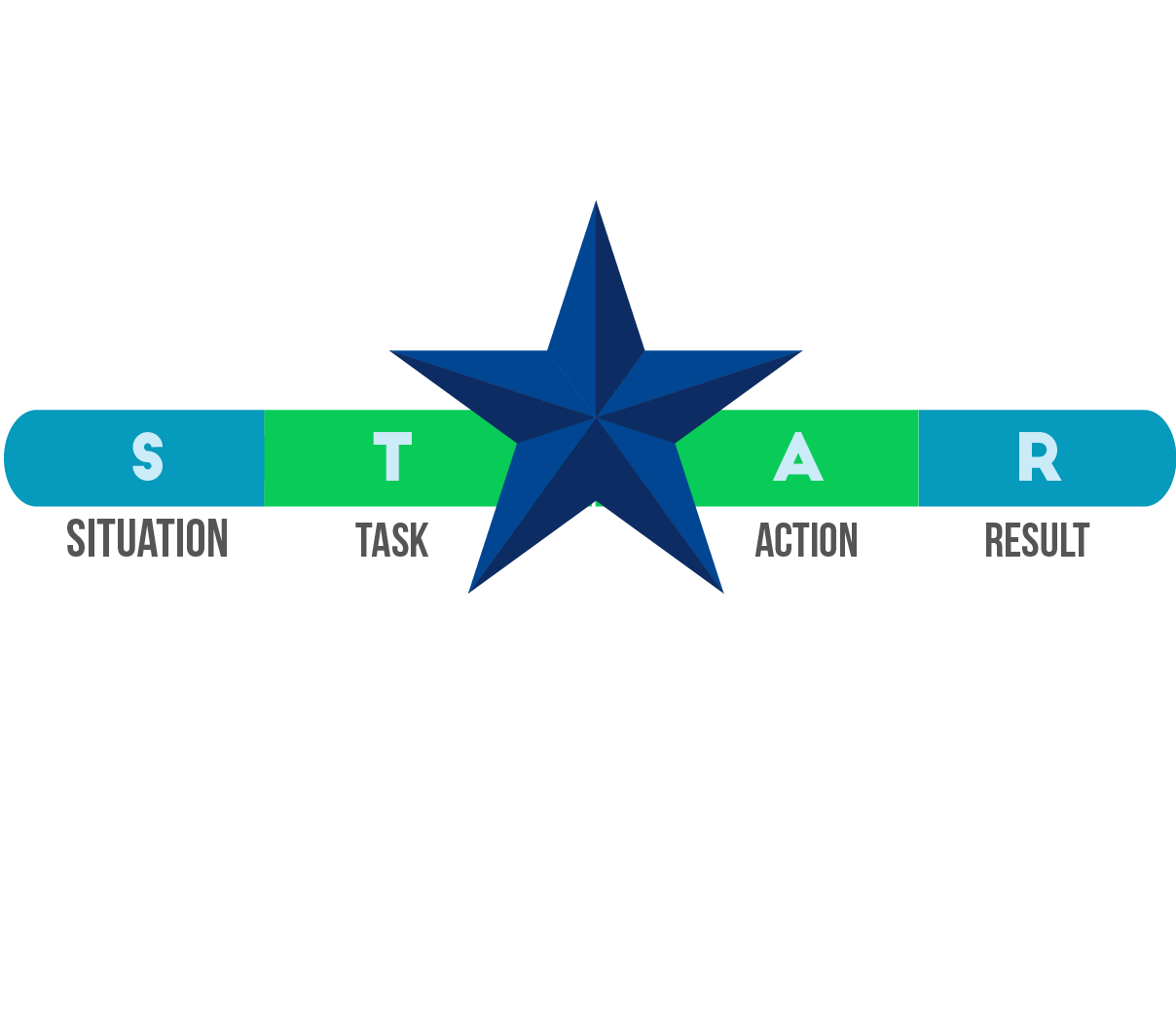Star interview questions, which are also called behavioral interview questions, are becoming more and more common during the job process. These questions are meant to find out what a candidate has done and how they have behaved in the past to predict how well they will do in the future.
STAR stands for Situation, Task, Action, and Result, and the interviewee is expected to give specific examples from their past that show their skills, abilities, and method of solving problems.
By asking about real-life examples and events, STAR questions help employers learn more about a candidate's skills, how they make decisions, and how they deal with problems. These questions help companies figure out if a candidate is right for the job description and if they will do well in the company.
STAR interview questions are a sort of common behavioral interview questions that are frequently used by employers to evaluate a candidate's prior behavior and performance in particular settings. Candidates are prompted to answer behavioral questions to provide concrete examples of how they have handled difficult situations or problems in the past.
Such inquiries include:
- Tell me about a moment when you had to change course mid-project.
- How do you handle workstreams that are collaborative?
- It can be difficult to give a coherent example on the spot. However, you can be prepared with a few responses with the correct preparation and a STAR interview framework.
Employers hope to learn more about a candidate's past actions to forecast their success in the future by employing STAR interview technique questions. Instead of giving hypothetical or speculative replies to these questions, candidates might present specific instances of their abilities, talents, and accomplishments.
STAR - this is an acronym for 4 critical stages that need to be followed in an interview. STAR questions are to be considered especially in behavior-based or competency-based interviews, as an interviewer always looks forward to understanding the candidate’s previous experiences, obstacles handled, leadership skills, performance under pressure, and other such factors.
STAR questions are extremely structured behavioral interview questions where answers are provided by explaining the Situation, Task, Action, and Result of a particular topic are provided to the interviewer.

01. Situation
The candidate is supposed to share a very detailed description of a challenging situation where he/she overcame a lot of difficulties to achieve a specific goal. A candidate is expected to provide as much detail as he/she can for the interviewer to analyze their hurdle handling capabilities. It doesn’t have to be restricted to a job from the past and can be spread across all experiences, such as volunteering or any other such encounters.
02. Task
What was the goal that the interviewee was trying to achieve? An interviewer seeks to understand the targets achieved by the candidate in the past to decide whether or not he/she will be able to manage the organization’s culture and achieve its goals.
03. Action
A candidate is expected to share an aggregate of actions taken to complete a particular task. Steps taken to solve problems while trying to achieve a goal, contribution as a member to finish an assigned task within the expected time frame, and details such as these will make the interviewer believe in what the candidate has to bring to the table.
04. Result
Irrespective of how big or small a candidate’s contribution was, he/she must explain the outcome of the activities done to achieve the goal. Whether the goal was overachieved or underachieved and how well the candidate performed in that situation. This is a factor where none of the interviewees must shy away from boasting about the work done to achieve a certain goal.
The most important aspect to consider in STAR questions is to be specific and detailed in every interview step and ensure that the specificity does not convert into verbosity. It will be better if the negatives of the previous job are kept at bay, and the positives are highlighted in the best possible manner.
Here are 4 tips to bear in mind while preparing for a STAR interview:
01. Include details
An interviewer would want to hire an individual who can step in to solve a company's challenge. Details about how the candidate contributed to solving the organization's problem within the desired time frame. This highlights the candidate’s perseverance, leadership skills, and the will to learn along the way.
It is advisable to include details that highlight the positives, such as percentages or procedures. Generic answers such as “The results were better than last time” or “We achieved our desired numbers” will leave the interviewer disinterested.
02. Avoid beating about the bush
What a candidate has achieved in the past is what needs to be showcased. Proving to an interviewer that he/she is best suitable for a particular job role is important, but not at the cost of sounding too full of oneself. Candidates must highlight incidents that portray their problem-solving capabilities, communication, and leadership skills.
03. Don’t rush
Suppose a candidate makes use of the STAR method helps to answer behavioral interview questions. In that case, it is best if he/she avoids rushing through the interview as it may give the impression that the candidate is nervous or not confident of what he/she is explaining.
Taking too much time to answer is the other extreme of time. A candidate can take 2-3 minutes to answer each of the interview questions.
04. Use first singular person
It will be more impactful if the candidates express their stories and experiences in the singular first person rather than the plural to keep the interviewers engrossed in a conversation.
For example, if the interviewer intends to understand the individual's contribution, “I performed under pressure...” will be more effective than “We performed under pressure..”
In the first method, you can arrange a panel that would respond to your surveys and give you precise insights. As a panel consists of selected, filtered, and handpicked individuals who already qualify for the research, asking them questions and getting insights is easier, far more accurate, and detailed.
The second method is applied on-site for B2B or B2C purposes, where you appoint interviewers, or in most cases, employees, to collect data on mobile devices. This method is very effective during concerts or live events where face-to-face data collection is possible for understanding user experience and making improvements.
Another way of conducting this research is by collecting data from locations where the internet isn’t available. In such cases, the data collected offline will get automatically synced once the internet becomes accessible.
For a question such as: “Tell us about a time when you showed extreme patience and performed above everyone’s expectations under immense pressure.”
01. Situation
“In my previous organization, website signups and conversions were reducing quarter after quarter in 2017.”
02. Task
“It was my responsibility to develop efficient market-approved ideas to improve the website and increase website signups and conversions by at least 20% in the first quarter of 2018.”
03. Action
“I designed a plan to revamp the website homepage with attractive call-to-actions. I also optimized the blogs and created a plan to generate new content every week to boost website traffic.
All these blog pages had CTAs so that if visitors wish to sign-up from a particular page, they easily can. The email marketing team was informed about my targets, and with a few email campaigns in a quarter, the sign-ups improved.”
04. Result
“By the end of the first quarter of 2018, my team and I were successful in increasing sign-ups by 20%.”
Here are 5 STAR interview questions, similar to the one mentioned in the section above, which can be used in behavior-based on upcoming interview and job interviews:
Question 01: Share with me an incident where there you had a discord with your team member.
STAR Answer: There was a project where my colleague and I had a massive difference of opinion about an implementation change. I understood that I couldn’t let this dispute go any further and took the initiative to apologize, had a meeting with her, and came to a common ground which we both agreed upon.
Question 02: Tell me about a time when you made a huge mistake and how you dealt with it.
STAR Answer: An urgent order needed to be dispatched on a particular date. I mentioned the wrong date in the package, and it was delivered a day later than expected. I took 100% responsibility and told the client about what happened, making them trust me and the company to continue purchasing from us.
Question 03: Have you ever managed a difficult employee from another team for an urgent project?
STAR Answer: There was a time my department had to work on a lead we generated from the website, and since the sales executives handled closure, I took the responsibility to coordinate with them. But, the sales executive had his hands full and wasn’t taking much interest in the lead my team generated. I made him understand the importance of the deal and its evaluation, which interested him in the lead. After that incident, we always worked on website-generated leads together.
Question 04: Describe a goal that you found extremely demanding.
STAR Answer: In 2017, I had to produce 8 new website pages for the last two quarters. I divided the goal into smaller targets, making creating the layout and content easier and guiding the developers to create the pages before the end of December 2017.
Question 05: Share with me an incident when you had to pacify an extremely unhappy customer.
STAR Answer: A client was not happy with the packaging on her order and was in no mood to calm down, even after trying to convince her multiple times. After sending a complimentary gift as compensation, I could persuade her not to write a negative review on our website but instead convinced her to write a positive one.
Today, a ton of guidance is available online, including videos, blogs, and books. Why are some of us feeling so lost? Customers that performed poorly in competency interviews frequently come to us for interview training.
A customer may frequently complain that his or her queries lack sufficient detail. Why don't they elaborate on this more? Others could have already planned, but they run into trouble when they realize their response isn't quite appropriate. Different inquiries are posed to them, but they remain silent.
- Lack of planning and not taking enough time to think about what went wrong.
- Hard time remembering exact details and examples.
- Not good at telling stories and having trouble putting answers in the STAR style.
- There isn't a lot of professional experience or encounters that fit the STAR question exactly.
- There was nervousness and stumbling during the interview because of nerves and pressure.
- Focusing too much on describing the situation and deeds and not enough on skills and results.
To overcome these challenges
- Review your past events and think of relevant examples to fully prepare.
- Learn how to tell stories and how to structure your answers using the STAR method interview questions.
- Stay cool and collected during the interview, and try to give clear and concise answers.
- Show how what was done had an effect and what happened as a result.
- Set aside enough time before the job interview to think and get ready.
Final Words
STAR interview questions have established themselves as a successful and popular method for assessing applicants during the recruiting process. When used with platforms like QuestionPro, STAR interview method questions have become an effective tool for a hiring manager.
Employers can learn more about candidates' skills, problem-solving abilities, and behavioral qualities by applying the Situation, Task, Action, and Result framework. The STAR questions' organized methodology guarantees consistent assessments, promoting just decision-making.
The QuestionPro platform makes it simple to incorporate STAR questions into the interviewing process, giving companies the ability to compile thorough data and make wise hiring decisions. STAR interview questions delivered by QuestionPro aid in the selection of the best candidates for organizational success by placing a strong emphasis on previous experiences and behavioral competencies.
Get Your Free Account Now
 Survey Software
Easy to use and accessible for everyone. Design, send and analyze online surveys.
Survey Software
Easy to use and accessible for everyone. Design, send and analyze online surveys.
 Research Suite
A suite of enterprise-grade research tools for market research professionals.
Research Suite
A suite of enterprise-grade research tools for market research professionals.
 CX
Experiences change the world. Deliver the best with our CX management software.
CX
Experiences change the world. Deliver the best with our CX management software.
 Workforce
Create the best employee experience and act on real-time data from end to end.
Workforce
Create the best employee experience and act on real-time data from end to end.












